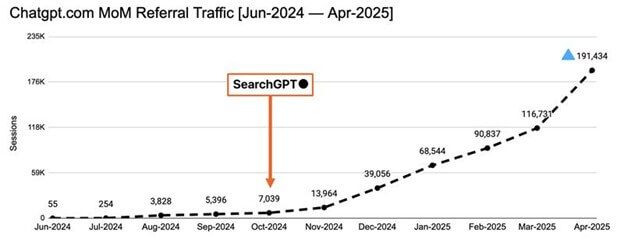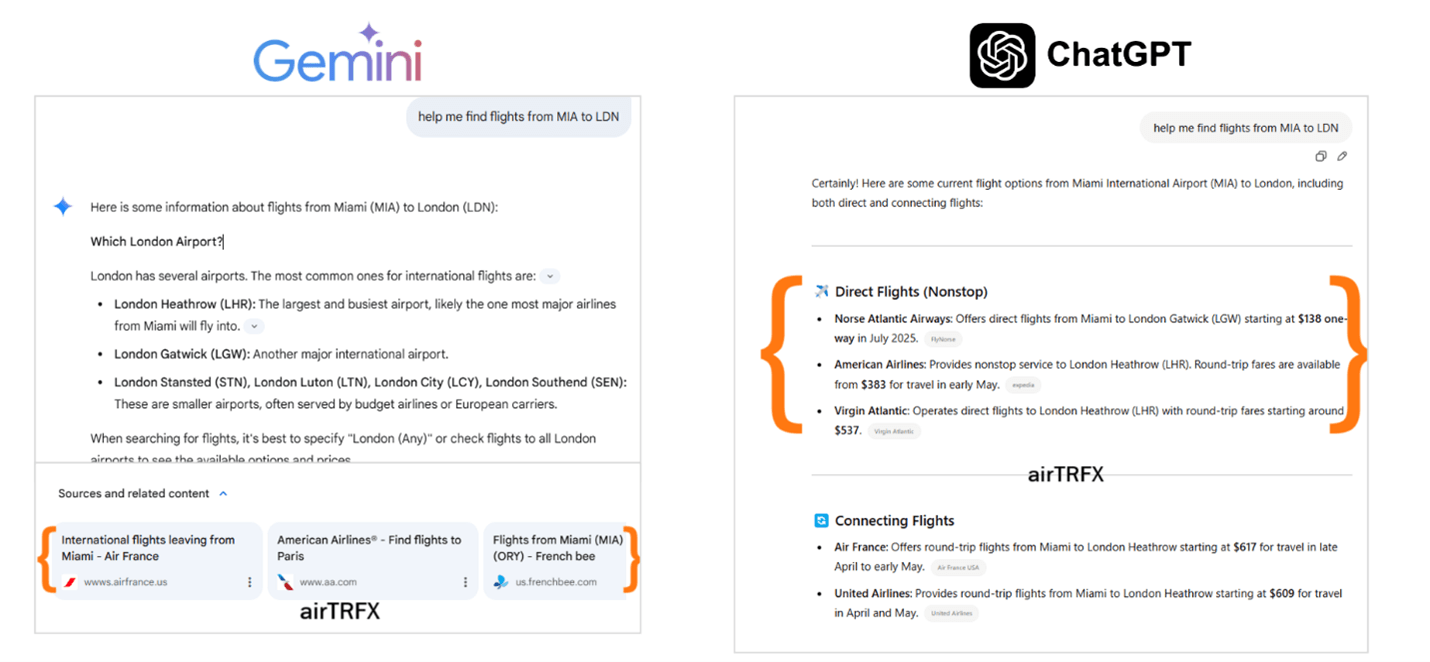The way travelers search, plan, and book flights is undergoing a seismic shift and AI is at the heart of it. With the explosive rise of ChatGPT, Google Gemini, and Perplexity, AI-powered search engines are rapidly changing the rules of digital engagement. During Outperform, PROS SEO Manager Sebastian Torres unpacked the implications of this change for airline SEO and direct channel traffic along with the key opportunities airlines must act on now.
The New Travel Planning Funnel: Condensed by AI
Travelers are no longer piecing together information across dozens of tabs. AI models now deliver fast, highly informed answers in a single prompt, moving users from inspiration to decision in seconds. According to recent studies, more than 70% of travelers are already using or open to using AI to plan trips in 2025. This shift is collapsing the traditional funnel and introducing a new traveler mindset: one that expects instant, curated insights.
AI Traffic Is Real and Growing Fast
Sebastian shared exclusive insights from PROS’ study of 110 airlines using airTRFX. AI-generated traffic to airline pages—primarily from ChatGPT—grew 20x in just six months, reaching nearly 200,000 sessions in April 2025. Although AI referrals currently represent just 1–2% of organic traffic, their growth is rapidly accelerating. More importantly, these users show higher booking intent, converting at significantly higher rates than traditional search users.

airTRFX Is Ready for the AI Search Era
The good news? airTRFX pages are already appearing in AI-generated answers across tools like ChatGPT, Gemini, Copilot, and Perplexity. In fact, city-to-city flight pages and non-branded keyword queries are being cited and clicked in growing numbers. Airlines using airTRFX are well positioned to benefit, especially if they optimize content for semantic relevance and conversational search patterns.

What Airlines Should Do Now
To stay ahead in this evolving landscape, airlines must:
- Ensure large language model (LLM) crawlability: Review robots.txt and server settings to avoid blocking bots.
- Enhance semantic content: Include traveler-focused details like flight duration, airport info, and route facts.
- Track AI behavior: While tools are still emerging, start monitoring referral traffic via GA4 and get familiar with the OpenAI API and other LLM outputs.
- Monitor intent-driven metrics: Use proxy KPIs like PROS’ Flight Search Indication (FSI) to track engagement.
Looking Ahead: A New Search Normal?
AI-powered search is still young but it’s growing fast. With Google AI Mode rolling out and GPT-5 on the horizon, AI-generated search results may soon become the default experience. For airlines, this isn’t a threat but an opportunity to reach high-intent travelers ready to convert.
As Sebastian emphasized, “AI search may only account for 1% of traffic today, but in two years, that could be 5%, 10%, or more. And those users? They’re not browsing. They’re booking.”
Frequently Asked Questions:
AI tools like ChatGPT, Google Gemini, and Perplexity are streamlining the travel planning process. Instead of browsing multiple tabs, travelers now receive curated, conversational answers in a single prompt—moving from inspiration to booking in seconds.
It means travelers are skipping traditional research steps. AI delivers fast, relevant insights, so airlines must ensure their content is optimized to appear in these AI-generated answers to capture high-intent users early.
Yes—and it’s growing fast. PROS’ study of 110 airlines using airTRFX showed a 20x increase in AI-generated traffic in just six months, with users from AI sources converting at higher rates than traditional search users.
They are. City-to-city flight pages and non-branded keyword queries are increasingly being cited in AI tools like ChatGPT, Gemini, and Perplexity, positioning airTRFX users to benefit from this shift.
Key actions include:
– Ensuring LLM crawlability (check robots.txt and server settings)
– Enhancing semantic content with traveler-relevant details
– Tracking AI referral traffic via GA4 and APIs
– Monitoring intent-driven metrics like Flight Search Indication (FSI)
While tools are still evolving, airlines can start by monitoring referral traffic from AI tools in GA4 and using proxy KPIs like FSI to gauge engagement and booking intent.
It’s quickly becoming the new normal. With Google AI Mode and GPT-5 on the horizon, AI-generated results may soon dominate search. Airlines that adapt early will be best positioned to capture high-converting traffic.
